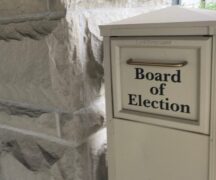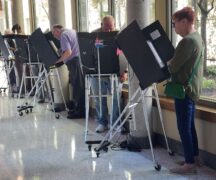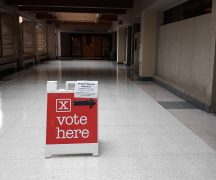Please read the August 20, 2024 article posted by David Dupont at:
https://bgindependentmedia.org/attempt-to-spike-names-from-voter-rolls-fails/, then read below.
Per Ohio law (Ohio Revised Code/ORC), Board of Elections members:
John T. Cuckler, Andrew J. Newlove, J. Douglas Ruck, Zachary Schmidt
SIGN AN OATH to support the state’s constitution and perform duties of the office. Elections officials are provided with Handbooks, etc. as resources for them to do their jobs as they were appointed to, and are PAID for. There are also Directives issued by the Secretary of State to follow. Some are generally applicable, others cyclical, specific, or special in nature. This seems very regimented, yet, not all procedures are dictated. Board members DO have authority to apply common sense and critical thinking to make discretionary decisions in order to fulfill their duties within the law. (ORC 3501.08)
With respect to general duties for maintaining voter rolls, it is the LAW for board members to “INVESTIGATE and determine the residence qualifications of electors”, “maintain a voter registration database of all QUALIFIED electors”, and “REMOVE ineligible electors”. (ORC 3501.11 (Q), (T) (U))
The Board is also responsible for following the law and an annual Secretary of State directive to complete a process through which ineligible records of voters who moved from Ohio are purged.
The process uses the USPS National Change of Address (NCOA) database and requires records to be flagged as “Confirmation” status. That law and directive have been adhered to. Shockingly, the process allows ineligible voter records to remain on rolls AT LEAST 4 YEARS with the same voting rights as “Active” status records. The current year process, completed in July 2024, purged about 158,000 records of voters who moved from Ohio through April 2020. Records for voters who moved in May 2020 to the present date remain on voter rolls, subject to potential fraudulent use, which is unacceptable for anyone with even half an interest in ensuring election integrity. Sadly, the Board is satisfied by achieving this low standard. (ORC 3503.21 (B)(1)&(2)&Directive 2024-06)
The same law allows any eligible voter to challenge eligibility status of another voter by submitting the prescribed Form No. 257. I submitted 103 forms on June 21, 2024 and 112 forms (95 resubmitted) on August 13, 2024. I acknowledged it would have been insufficient to submit challenges solely on the basis of NCOA data. Therefore, my reasons for challenging residency of voters were: they moved, filed an address change with NCOA, AND registered to vote in their moved to state, AND voted in their moved to state. (ORC 3503.21 (A)(1)&ORC 3503.02 (E)(H))
Although the Board insists burden of proof is the responsibility of challengers, that is NOT THE LAW. There is no obligation of challengers to provide certified evidentiary documentation for a challenge to be approved. Board members CANNOT abdicate THEIR responsibilities to challengers. In a sincere effort to ASSIST them with their task, along with help from many volunteers, I provided supplemental documentation as a seed which would lessen their investigation efforts. It is correct, no social security numbers were provided because that information is legally kept inaccessible from the public. However, full names, addresses, dates of birth, and other data elements were provided to assure accuracy when they would do their work, using information available to them. VERIFIABLE government data from outside sources was included. They were able to determine voters did NOT maintain residency status in order to remain eligible Ohio voters. Instead, board members FAILED TWICE to fulfill their duties by NOT reviewing information they had nor that which was made available to them. With the 1st submission of challenges, a legal hearing was not held, and there is a host of information about that.
At the hearing regarding the 2nd submission of challenges, J. Douglas Ruck (Attorney) claimed “statute specifically ties our hands. We cannot remove someone on residency alone”. This is COMPLETELY FALSE. The very law he cited to authorize removal of ineligible voter records under the NCOA process also provides for removal of ineligible records under the voter challenge process. The law is clear. It is NOT up to the board’s discretion to cherry-pick which law sections they will follow and which ones they will choose to ignore. Furthermore, Ruck attempted to justify shirking their duties stating “the Secretary of State can promulgate procedures for investigation but he hasn’t done that”. Again, cherry-picking from the section pertaining to the NCOA process, and NOT TRUE with respect to the voter challenge process.
The Secretary of State is well known for referring to Ohio elections as the “national gold standard”. He has recently issued directives reiterating the board’s duties to “MAINTAIN ACCURATE VOTER ROLLS, AND THAT REQUIRES CONSTANT VIGILANCE”. He’s offered examples of methods which “may be necessary to obtain accurate information” including that “the board of elections may refer to outside data sources to assist in its research”.
Why is the Wood County Board of Elections opposed to ensure election integrity by maintaining accurate voter rolls? Other county Boards of Elections within the state are honorably fulfilling their duties, according to the law, by removing ineligible records of voters who have moved from Ohio. Alas, for our Lucas County neighbors, your Board of Elections received 582 voter record challenges and they blatantly disregarded the law meeting in secret to deny 100%, also for an invalid reason.
Please fact check and become further informed:
https://www.deletevotingmachines.org
Taina Romstadt
Lake Township/Northwood





